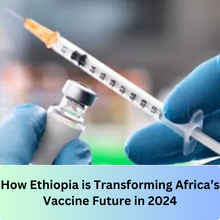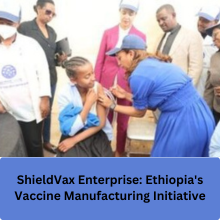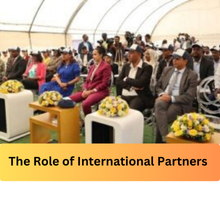
In recent years, Africa has faced major challenges in its quest for equitable access to life-saving vaccines, particularly during the COVID-19 pandemic. The continent’s reliance on global vaccine suppliers exposed the critical need for self-sufficiency. Ethiopia, a country with a growing ambition to lead in health innovations, is now stepping up as a major player in local vaccine manufacturing.
As part of the African Union’s bold strategy, Ethiopia is working tirelessly to ensure the continent can produce 60% of its vaccine needs by 2040. This goal is not just a vision; it’s an actionable plan that Ethiopia is helping to shape, with the aim of making vaccines more accessible and reducing dependence on external suppliers.
Africa’s Vision for Vaccine Self-Sufficiency
The African Union’s ambitious plan to produce the majority of vaccines used across the continent is a response to the gaps in vaccine availability, especially highlighted during the COVID-19 pandemic. As the global health crisis unfolded, Africa found itself at the mercy of vaccine supplies from wealthier nations, with significant delays and shortages impacting public health efforts.
In response, the African Union devised a strategy for self-sufficiency in vaccine production. The goal is clear: by 2040, Africa should produce 60% of the vaccines it needs, ensuring that no African country has to wait for life-saving treatments due to logistical and supply chain issues.
Ethiopia’s Key Role in Africa’s Health Vision
Ethiopia, one of the largest countries in Africa, has committed itself to becoming a leading force in the continent’s health transformation. Dr. Mekdes Daba, the Minister of Health, emphasized Ethiopia’s role in addressing the gaps exposed by the pandemic. The Ethiopian government understands that local vaccine production is essential not only for national health security but also for regional stability.
As part of this vision, Ethiopia launched the ShieldVax Enterprise in August 2023. This bold initiative aims to spearhead the country’s vaccine manufacturing capabilities, ensuring that Ethiopia is prepared to meet its vaccine needs and contribute to the African continent’s self-sufficiency.
ShieldVax Enterprise: Ethiopia’s Vaccine Manufacturing Initiative
ShieldVax Enterprise was launched with the goal of making Ethiopia a key player in vaccine production. This initiative is set to transform the local health landscape by building the infrastructure and capacity needed to produce vaccines for Ethiopia and its neighbors.
The initiative aims to produce a range of vaccines, from routine immunizations to emergency vaccines needed in response to outbreaks. ShieldVax is also focused on training local talent, developing cutting-edge research facilities, and building a robust manufacturing facility to ensure the highest standards of vaccine production.
Securing Funding and Infrastructure Development
A critical component of ShieldVax Enterprise’s success has been securing funding. The World Bank has played a vital role in ensuring that Ethiopia has the financial resources to kickstart its vaccine manufacturing capabilities. In addition, Ethiopia has allocated 24,000 hectares at the Kilinto Industrial Park in Addis Ababa for the construction of a state-of-the-art vaccine production facility.
The industrial park will host cutting-edge vaccine production facilities, including the necessary infrastructure for research and development. This site will be pivotal in transforming Ethiopia into a major vaccine hub for the continent. Construction of the facility is set to begin soon, and the government is excited about the progress made so far.
Also read: Snowstorm Hits: School Delays & Closures in North Dakota
Building the Regulatory Framework for Vaccine Production
Regulatory readiness is just as important as physical infrastructure when it comes to vaccine production. The Ethiopian Food and Drug Authority (EFDA) is working diligently to meet the WHO ML-3 (Manufacturing Level 3) regulatory standards by early 2025. This milestone is critical for ensuring that the vaccines produced meet global standards for safety and efficacy.
Achieving ML-3 status means that Ethiopia will be able to independently regulate and approve vaccines for local use, ensuring that the country can produce safe and effective vaccines without relying on external bodies for approval.
Strengthening Research and Development Capabilities
A cornerstone of Ethiopia’s vaccine manufacturing strategy is its focus on research and development (R&D). The Armauer Hansen Research Institute, which is Ethiopia’s leading biomedical research facility, is expanding its capabilities to support domestic vaccine production.
Research is at the heart of developing new vaccines, and Ethiopia is positioning itself as a leader in R&D. The country’s investment in scientific innovation will support the local production of vaccines tailored to Africa’s specific health needs.
Strategic Partnerships for Sustainable Manufacturing
No country can achieve self-sufficiency in vaccine production alone. Partnerships with regional and international organizations are key to ensuring the sustainability and success of Ethiopia’s efforts. Ethiopia is working closely with regional organizations such as the East, Central, and Southern Africa Health Community (ECSA) and the Intergovernmental Authority on Development (IGAD).
These partnerships foster competitive manufacturing capabilities and ensure that Ethiopia is well-integrated into the regional health ecosystem. Collaborative efforts across borders will play a vital role in strengthening health systems and making vaccines more accessible to all African countries.
The Role of International Partners
International organizations such as the World Health Organization (WHO), the African Centers for Disease Control and Prevention (Africa CDC), and the World Bank are playing significant roles in Ethiopia’s vaccine manufacturing initiative. Their support helps Ethiopia ensure that the vaccines produced meet global standards and that the country is on track to meet its health goals.
These global partnerships are vital for ensuring that Ethiopia’s vaccine production capabilities are sustainable, scalable, and capable of addressing Africa’s health needs both now and in the future.
Building Resilient Health Systems Across Africa
Ethiopia’s move towards local vaccine production is not just about vaccines—it’s about building a resilient health system. With the support of international and regional partners, Ethiopia aims to improve its healthcare infrastructure, ensuring that vaccines are accessible, affordable, and safe for everyone.
By manufacturing vaccines locally, Ethiopia can create a more self-reliant health system, reducing dependency on external suppliers and improving overall public health preparedness.
Ethiopia’s Commitment to Regional Collaboration
Ethiopia’s leadership in vaccine manufacturing demonstrates its dedication to improving health outcomes across Africa. The country is focused not only on its own health but also on creating a regional network of collaboration. Shared responsibility and partnerships with neighboring countries will ensure that Africa is better prepared for future health emergencies and can build sustainable, effective health systems.
Also read: Experience Bhutan’s Spiritual Secrets and Ancient Festivals
Conclusion
Ethiopia’s bold move towards local vaccine manufacturing is a testament to its leadership in Africa’s health transformation. By focusing on infrastructure development, regulatory readiness, and strategic partnerships, Ethiopia is not only working to meet its own vaccine needs but also contributing to Africa’s broader health vision.
The road ahead may be challenging, but Ethiopia’s commitment to this cause offers hope for a healthier, more self-sufficient Africa. With continued investments in manufacturing, research, and collaboration, Ethiopia will play a pivotal role in shaping Africa’s health future.
FAQs
-
Why is Ethiopia focusing on local vaccine manufacturing?
- Ethiopia’s focus on local vaccine manufacturing stems from the need for self-sufficiency, ensuring that Africa has access to vaccines regardless of global supply chain issues.
-
What is ShieldVax Enterprise?
- ShieldVax Enterprise is Ethiopia’s initiative to set up local vaccine manufacturing, aiming to meet the country’s vaccine needs and support regional health initiatives.
-
How will Ethiopia ensure vaccine quality and safety?
- Ethiopia plans to achieve WHO ML-3 regulatory status by early 2025 and ensure that all vaccines meet global safety and quality standards.
-
What role do partnerships play in this initiative?
- Partnerships with regional organizations like IGAD and ECSA, and international bodies like WHO and the World Bank, are crucial for the success and sustainability of Ethiopia’s vaccine production plans.
-
What is the timeline for the completion of Ethiopia’s vaccine manufacturing plant?
- The construction of the vaccine manufacturing facility at the Kilinto Industrial Park is set to begin soon, with production expected to start in the coming years.

